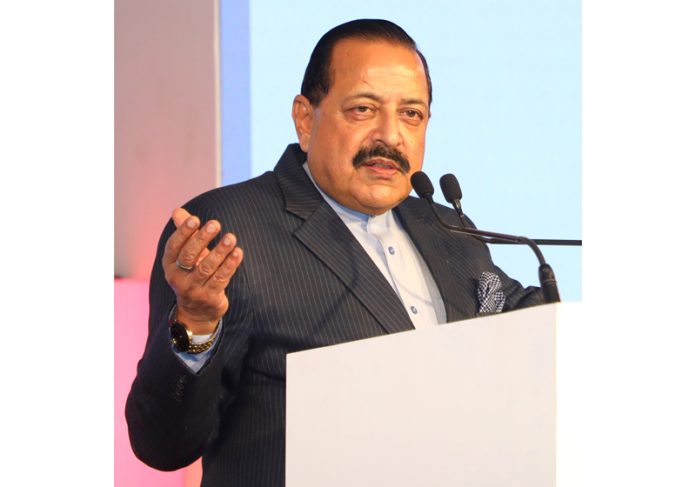
Excelsior Correspondent
NEW DELHI, Feb 10: “Fragile 5” to “Top 5”, its India’s “case study” journey of the last ten years, which could amuse and enthuse any student of Economics, said Union Minister Dr Jitendra Singh.
From cynicism and scams of the past, the last decade under the leadership of Prime Minister Narendra Modi has been an opportunity to get over that dubious distinction, he said, adding, this marked the beginning of the journey from pessimism to optimism.
The Union Minister of State (Independent Charge) Science & Technology; MoS PMO, Personnel, Public Grievances, Pensions, Atomic Energy and Space, was addressing the Global Business Summit ‘The Big Shift – Measuring the Forces of Change’ organised by the Times Group.
Dr Jitendra Singh said, in the last ten years under PM Narendra Modi’s leadership, India recorded a rapid rise across various global parameters and universal benchmarks.
Today India has emerged as the fifth largest economy in the world and in the Global Innovation Index we ranked 81 in 2014, we have jumped 41 places, today we are No. 40 in the world, he said.
Dr Jitendra Singh said, India has the 3rd largest Startup Ecosystem globally and is home to the fastest-growing unicorns.
“From just over 350 StartUps in the year 2014,India grew over 300 times. After PM Modi gave the clarion call ‘StartUp India, Stand Up India’ from the ramparts of the Red Fort in his Independence Day address and rolled out the special StartUp scheme in 2016, today we have over 1,30,000 StartUps, besides more than 110 Unicorns,” he said.
Dr Jitendra Singh said, even though talent was never lacking in the country, the missing link of enabling milieu was created under the leadership of PM Modi.
“Space reforms undertaken by PM Modi lifted the veil of secrecy that shrouded India’s Space programmes. With the opening up of the Space sector, the common masses have been able to witness the launch of the mega Space events like Chandrayaan-3 and Aditya,” he said.
Dr Jitendra Singh said, four-five years back, we had just one StartUp in the Space sector, today we have around 190 private Space Startups after opening up of the sector, while the earlier ones of them have even turned entrepreneurs. There has been an investment of over Rs.1,000 crore by private Space Startups in the current financial year from April to December 2023, he said.
Dr Jitendra Singh said, even though our Space Research programme started in the year 1969, the year when the US landed first man on the moon, we caught up fast with the Space faring nations and last year Chandrayaan-3 made a historic touchdown on the virgin lunar south polar region where nobody has landed before.
Stating that the “Anusandhan National Research Foundation” will pave the way for a greater Public Private Partnership (PPP) model in scientific research, Dr Jitendra Singh said the NRF will be a better model than the United States’ NRF.
“NRF budget envisions a funding of Rs. 50,000 crore over five years, out of which about 60%-70%, is estimated to come from non-government sources,” he said.
Reiterating that the age of silos is over, Dr Jitendra Singh said, the NRF envisions integration between Public and Private sector and will provide high-level strategic direction of scientific research in the country as per recommendations of the National Education Policy (NEP) – 2020.
Dr Jitendra Singh said this is possibly the best time for Innovators, R&D and Startups. PM Modi has delivered the right ecosystem that supports and augments Innovation, promotes entrepreneurship and fosters a thriving industry.
Mentioning that PM Modi liberated us from the self-imposed shackles of the past, Dr Jitendra Singh said the Government scrapped about 2,000 obsolete rules and deregulated the economy that earlier proved to be detrimental to attract FDI and spur growth.

